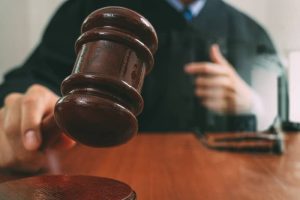Character Evidence – Prior Bad Acts – NC Criminal Law Update
In a recent (August 2, 2022) published opinion by the North Carolina Court of Appeals, the Court again addresses the  admissibility of 404(b) Character Evidence.
admissibility of 404(b) Character Evidence.
The State provided written notice of its intent to introduce evidence of prior conduct and “bad acts” and specific acts of conduct. Prior to trial, the Defendant objected to the admission of such Character Evidence, filing a Motion in Limine.
The Honorable Superior Court Judge Carl R. Fox denied Defendant’s Motion(s), allowing the admission of 404(b) – Character evidence not admissible to prove conduct; exceptions; other crimes.
Defendant appealed on several grounds, including the Rule 403 Probative Value / Prejudicial Effect Balancing Test and Rule 404(b), the rulings and judgment(s) imposed in the Superior Court in the Wake County (Raleigh) NC matter.
The opinion is written by Judge Allegra Colins. Judge Valerie Zachary concurs in the opinion. Judge Hunter Murphy dissents.
The NC Court of Appeal remands the case back to Superior Court for resentencing, concluding the trial court improperly considered the accused’s exercise of his Constitution Right to a Trial by Jury.
The convictions remain in place, pending resentencing.
Given Judge Murphy’s dissent, the rulings relative to the admission of Character Evidence may be subject to further review by the NC Supreme Court.
See: North Carolina vs Pickens, 2022-NCCOA-527
What is Character Evidence?
Under the rules of evidence in North Carolina, specifically, Rule 404(b), evidence at trial of other criminal acts, wrongs, and crimes relating to the person’s character should not be admitted to show the character of the defendant or that defendant acted in a way consistent with his or her character. 
OBX Criminal Defense Lawyers may refer to that as “Character Evidence.”
Rule 404(b) establishes the concept that:
Evidence of other acts, wrongs, or crimes should not be admitted to prove the character of a Defendant (the person accused of a crime) to show that they acted in conformity with some issue of character.
At the same time, such evidence may be admissible for other purposes.
The State must provide reasonable notice in criminal charges, as set forth in the Rules of Criminal Procedure, of its intent to introduce 404(b) Character Evidence.
Put simply, a conviction would be improper if predicated on prior bad acts and an alleged propensity to commit crimes, prior convictions, or the person acted consistent with a generally bad character, character trait, or the defendant’s pertinent trait of criminal charges.
The character trait of the defendant is generally not used as evidence in North Carolina to show that he or she acted in conformity with what allegedly took place during prior crimes or as a part of criminal wrongdoing, unless such evidence may fall within the exceptions to the general rule – Danny Glover, Outer Banks Criminal Lawyer
For example, the State cannot try to show the criminal defendant is guilty in a criminal case simply because of a prior guilty plea or conviction in the local community or that they’re a “known criminal.”
That would be improper character evidence.
What are those “other purposes?”
Prior instances of conduct may be deemed admissible at trial if they show the “M.O.” or modus operandi of the defendant. 
Rule 404(b) allows testimony of other wrongs, crimes, or acts when used to show:
- Intent
- Proving Motive
- Opportunity to commit the crime
- Plans and Preparation to commit a crime
- Knowledge of the crime
- Identity of the Defendant
- Absence of mistake
- Accident
- Entrapment
If the prosecutor intends to use 404(b) evidence, pretrial notice is generally required in Superior Court, thus providing the opportunity to object or rebut evidence.
What are the Rules of Evidence in NC?
The rules of evidence in NC are a set of legal principles that govern what types of information can be presented in court.
They are designed to ensure that only reliable and relevant information is presented so that the jury can make a fair and impartial decision about the case.
The rules also protect the rights of defendants, by ensuring that they are not convicted based on false or misleading information.
What is the Probative Value, Prejudicial Effect Balancing Test?
The probative value of evidence is its ability to prove something relevant to the case. 
The prejudicial effect of evidence is its ability to unfairly influence the jury.
When deciding whether to allow evidence at trial, the judge must balance the probative value against the prejudicial effect.
If the prejudicial effect outweighs the probative value, then the evidence may not be allowed under N.C. Rule of Evidence 403.
To be clear, evidence that hurts the defendant or tends to show the defendant committed a crime ordinarily would not be suppressed.
What is the Doctrine of Recent Possession?
The key is the prejudicial effect. Prejudicial means having the tendency to influence the jury in an unfair way.
The focus of the balancing test is on whether the probative value of the evidence outweighs its potential to cause prejudice and, therefore, an unfair conviction.
If there is a danger that the jury will be influenced in an improper or unfair way, then the evidence may be excluded.
What is Relevant Evidence?
Relevant evidence is any information that has a tendency to make the existence of a fact more or less probable.
If the judge finds that the probative value of the evidence outweighs its prejudicial effect, then it could be considered relevant and admissible at trial.
Is a Witness’s Character Relevant?
A witness’s character may be relevant if it goes to their credibility, or ability to be believed.
For example, if a witness has been convicted of a crime in the past, that may make them less credible in the eyes of the jury.
However, there are rules that limit how character evidence can be used.
In general, character evidence cannot be used to show that someone is more likely to have committed a crime.
What is the hearsay rule?
The hearsay rule is a legal principle that prevents second-hand information from being used as evidence in court. 
Hearsay is any statement that is made by someone other than the person who is testifying used to prove the truth of the matter asserted.
What is the Criminal Allegations Exception to Rule 404(b)?
The criminal allegations exception to Rule 404(b) allows evidence of other crimes, wrongs, or acts that are “substantially similar” to the crime charged.
To be admissible under this exception, the other crime must be substantially similar to the one that is charged, and it must be relevant to prove an element of the current crime.
For example, if someone is on trial for burglary, evidence that they committed a similar burglary in the past in the same way and using the same, somewhat unique methods to commit the crime, might be admissible under this exception.
The unique manner or MO of committing the crime could show the identity of the accused, thus being admissible.
A certain character trait, the unique or individual things a person acts or says or does things during the commission of a crime do not prove character.
There is a difference between proving character, whether it’s good character or bad character or the defendant’s pertinent trait, and arguing someone is guilty in criminal cases simply because they’ve made mistakes in the past – Danny Glover, OBX Criminal Defense Attorney
However, if the defendant is on trial for burglary and the only other crime that is substantially similar is shoplifting or a sexual assault, then the exception may not apply.
The reason for this is that shoplifting or a sexual assault likely is not substantially similar to burglary for which the accused stands trial.
In a criminal case, the jury may only consider this evidence if the Court (the Judge who rules on the admissibility of evidence) finds that the probative value of the other crime outweighs its prejudicial effect.
W is Pretrial Notice?
If the prosecutor intends to introduce 404(b) evidence of a person’s character, they must provide reasonable notice to the Defendant and their defense lawyer in a criminal case.
We don’t allow trial by ambush in North Carolina. Reasonable notice is required in a criminal case. That provides the opportunity to respond, rebut evidence, and prepare a defense – Danny Glover, OBX Lawyer
Outer Banks Criminal Defense Lawyer – Danny Glover Jr
If you have been accused of a crime or have a pending criminal case on the Outer Banks, it is important to speak with an experienced criminal defense attorney who can help you understand the rules of evidence and how they may apply in your legal matter.
It’s important to note, that an alleged victim’s pertinent trait or that of a police officer may become an issue at trial. Each fact pattern and each case is different. The Rules of Evidence apply to character evidence regarding both witnesses and the accused.
A person’s character and reputation in the community for honesty or telling the truth, may, in certain circumstances,be relevant for impeachment purposes in a criminal case.
Contact Danny Glover Jr. at DannyGloverLawFirm.com to discuss your case and learn more about your rights.
 North Carolina Criminal Law Updates
North Carolina Criminal Law Updates





